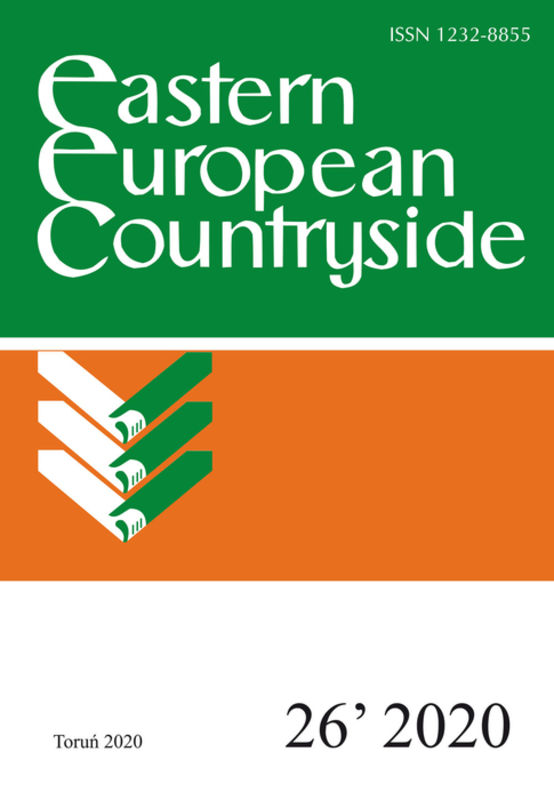Comparative study of social networks in post-socialist Western Balkan countries
Formal and informal networking for information diffusion
DOI:
https://doi.org/10.12775/EEC.2020.005Keywords
social capital, rural development, transition, Western BalkanAbstract
Rural areas in the Western Balkan are faced with severe socio-economic and political challenges, including a lack of access to knowledge and information as well as scepticism about formal forms of cooperation. Yet, the evidence regarding the influence of social capital and network structures on the access of the rural population to information and knowledge in these countries is still sparse, even though this can be one of the most influential factors shaping rural development. In this paper, a multi-country comparison was applied to provide empirical evidence of the existing level of social capital structures (networks) in North Macedonia, Serbia and Bosnia and Herzegovina. The conducted analyses indicate that even with the low participation rates, all farmers, both members and non-members of organisations, perceived membership in formal organisations as useful. Additionally, the results support the presumption that even sparse informal networks, mostly built on strong personal ties, are more effective channels for information transfer in the absence of efficient/active formalised types of cooperation. This implies that rural development policy should be crafted in a way to transform farmers from passive subjects into creative actors, particularly in sharing and promoting good practices.
References
Ahlerup, P., Olsson, O. & D. Yanagizawa, D. 2009 ‘Social capital vs institutions in the growth process’ European Journal of Political Economy 25(1): 1–14.
Bodin, O., Corona, B. 2009 ‘The role of social networks in natural resource gov- ernance: What relational patterns make a difference?’ Global Environmental Change 19: 366–374.
Bodin, Ö., Ramirez‐Sanchez, S., Ernstson, H. & C. Prell 2011 ‘A social relational approach to natural resource governance’ in: Ö. Bodin and C. Prell (eds.) Social networks and natural resource management: uncovering the social fabric of environmental governance, Cambridge: Cambridge University Press, pp. 3–28.
Bogdanov, N. & D. Janković 2013 ‘Territorial capital of rural areas: An example of analysis of the potential for rural tourism development in Serbia’ in:
D. Škorić, D. Tomić, and V. Popovic (eds.) Agri-food sector in Serbia state and challenges, Belgrade: Serbian Association of Agricultural Economics and Serbian Academy of Sciences and Arts, pp. 201–233
Borgatti, S. P. 2002 NetDraw: Graph visualization software, Harvard, MA: Analytic Technologies.
Borgatti, S. P., Everett, M. G. and L. C. Freeman 2002 UCINET for Windows software for social network analysis. Harvard, Cambridge, MA: Analytic Technologies.
Borgatti, P. S., Everett, G. M. and C. J. Johnson 2013 Analyzing social networks, London: SAGE Publications.
Chloupkova, J., Svendsen, L. H. G. and G. T. Svendsen 2003 ’Building and de- stroying social capital: The case of cooperative movements in Denmark and Poland’ Agriculture of Human Values 20: 241–252.
Granovetter, M. 2005 ‘The impact of social structures on economic outcomes’ Journal of Economic Perspectives 19(1): 33–50.
Kadushin, C. 2012 Understanding social networks, theories, concepts and findings, Oxford: Oxford University Press.
Lin, N. 2001 Social capital: A theory of social structure and action. Structural analysis in the social sciences, Cambridge: Cambridge University Press.
Lin, N. 2005 A network theory of social capital. In: Castiglione, D., Van Deth,
J. and G. Wolleb (eds.) Handbook on social capital, Oxford: Oxford University Press, pp. 50–69.
Mikiewicz, P. and K. Szafraniec 2009 ‘Rural social capital versus European and Global challenges’ (About “Good” and “Bad” Social Capital), Eastern European Countryside 15: 111–126.
Murray, C. 2006 Social Capital and Cooperation in Central and Eastern Europe Toward An Analytical Framework, 2006 Annual Meeting, August 12–18, 2006, Queensland, Australia 25647, International Association of Agricultural Economists.
Paldam, M. and T. G. Svendsen 2001 ’Missing social capital and the transition in Eastern Europe’ Journal for Institutional Innovation, Development and Transition 5: 21–34.
Putnam, R. D. 1993 Making democracy work: Civic tradition in modern Italy. Princeton, NJ: Princeton University Press.
Righia, A. 2013 ‘Measuring social capital: Official statistics initiatives in Italy’ Procedia – Social and Behavioral Sciences 72: 4–22.
Rockenbauch, T. and P. Sakdapolarak 2017 ‘Social network and the resilience of rural communities in the global south, a critical review and conceptual relation’ Ecology and Society 22(1):10.
Stam, W., Arzlanian, S. and T. Elfring 2014 ‘Social capital of entrepreneurs and small firm performance: A meta-analysis of contextual and methodological moderators’ Journal of Business Venturing 29: 152–173.
Stiglitz, E. J. 1999 Whither reform: Ten years of the transition. Paper prepared for the Annual World Bank Conference on Development Economics, Washington, DC, April 28–30.
Tuna, E., Krantininis, K.and L. Hajderlari 2014 Social networks in post-socialist countries: Informal networking patterns among dairy farmers in FYR FYR Macedonia. (Doctoral thesis). Swedish University of Agricultural Sciences, Uppsala, 2014: 109.
UNDP 2009 The ties that bind: Social capital in Bosnia and Herzegovina. Sarajevo, BiH. (2014, December 15). Retrieved from http://hdr.undp.org/en/content/ ties-bind.
Wasserman, S., and K. Faust 1994 Social network analysis, methods and applica- tions, New York: Cambridge University Press.
Downloads
Published
How to Cite
Issue
Section
License
Copyright (c) 2024 Emelj Tuna, Natalija Bogdanov, Aleksand Nikolic, Ana Simonovska

This work is licensed under a Creative Commons Attribution-NoDerivatives 4.0 International License.
Stats
Number of views and downloads: 110
Number of citations: 0



